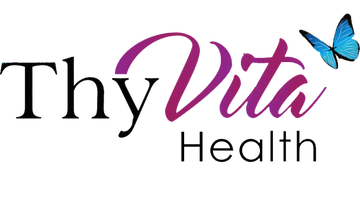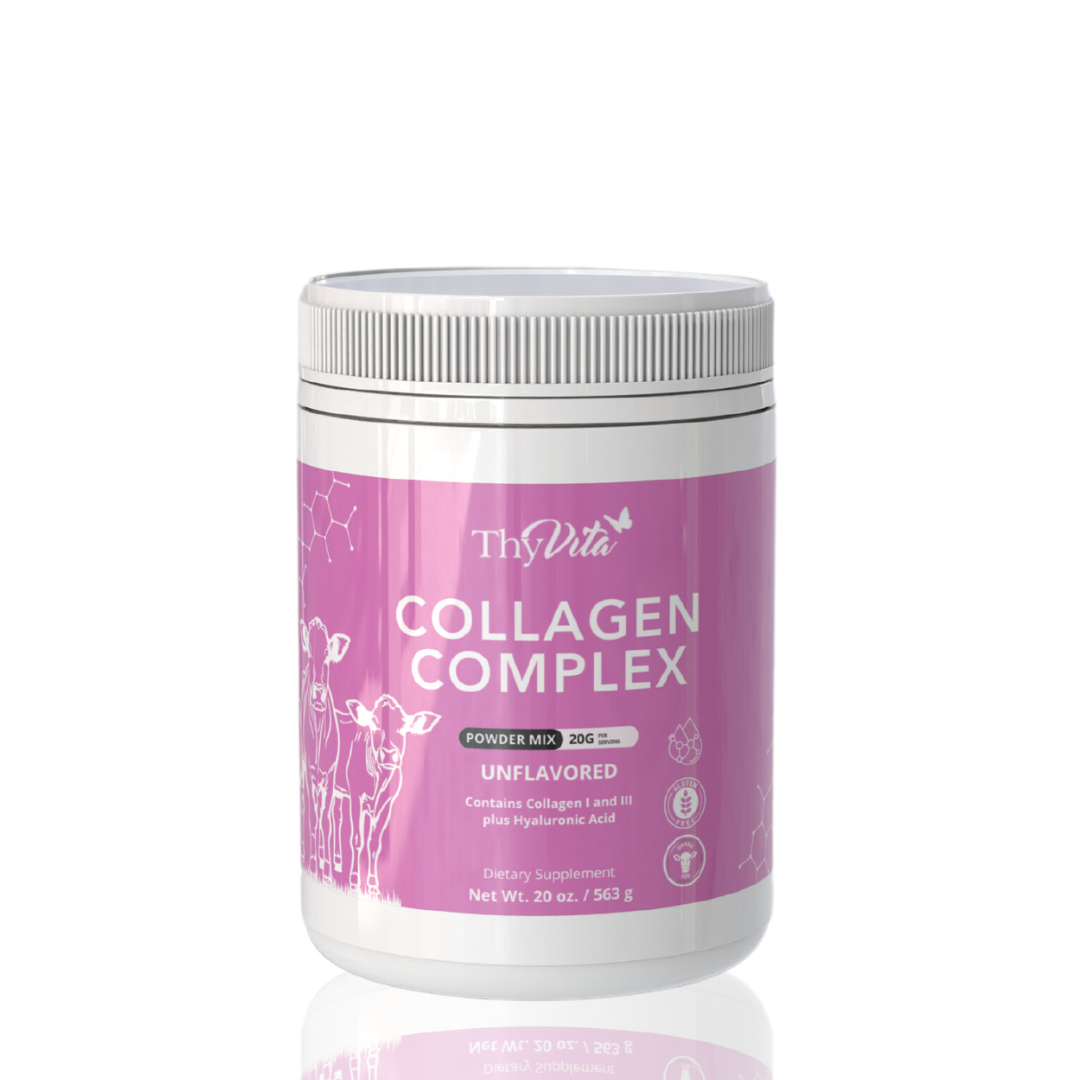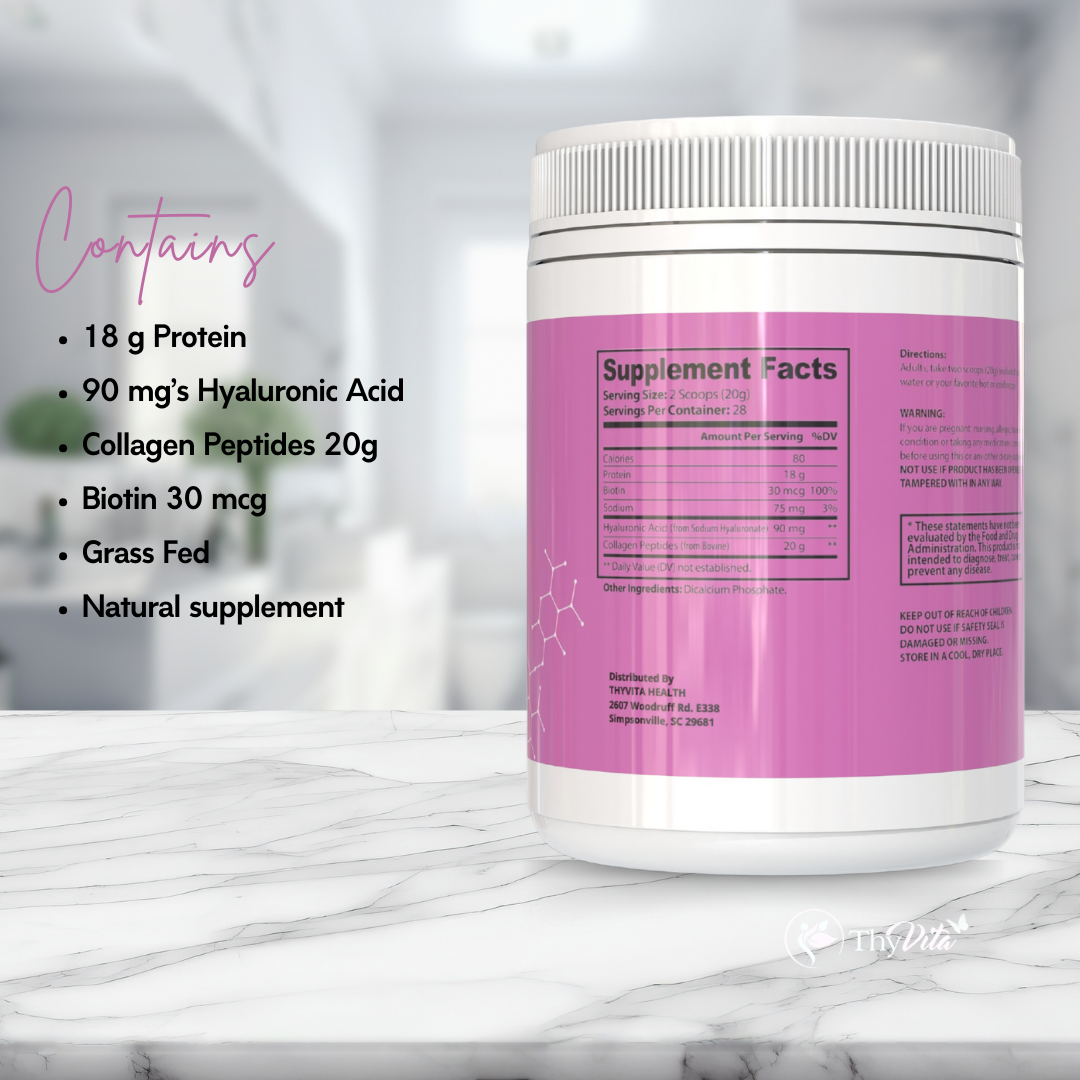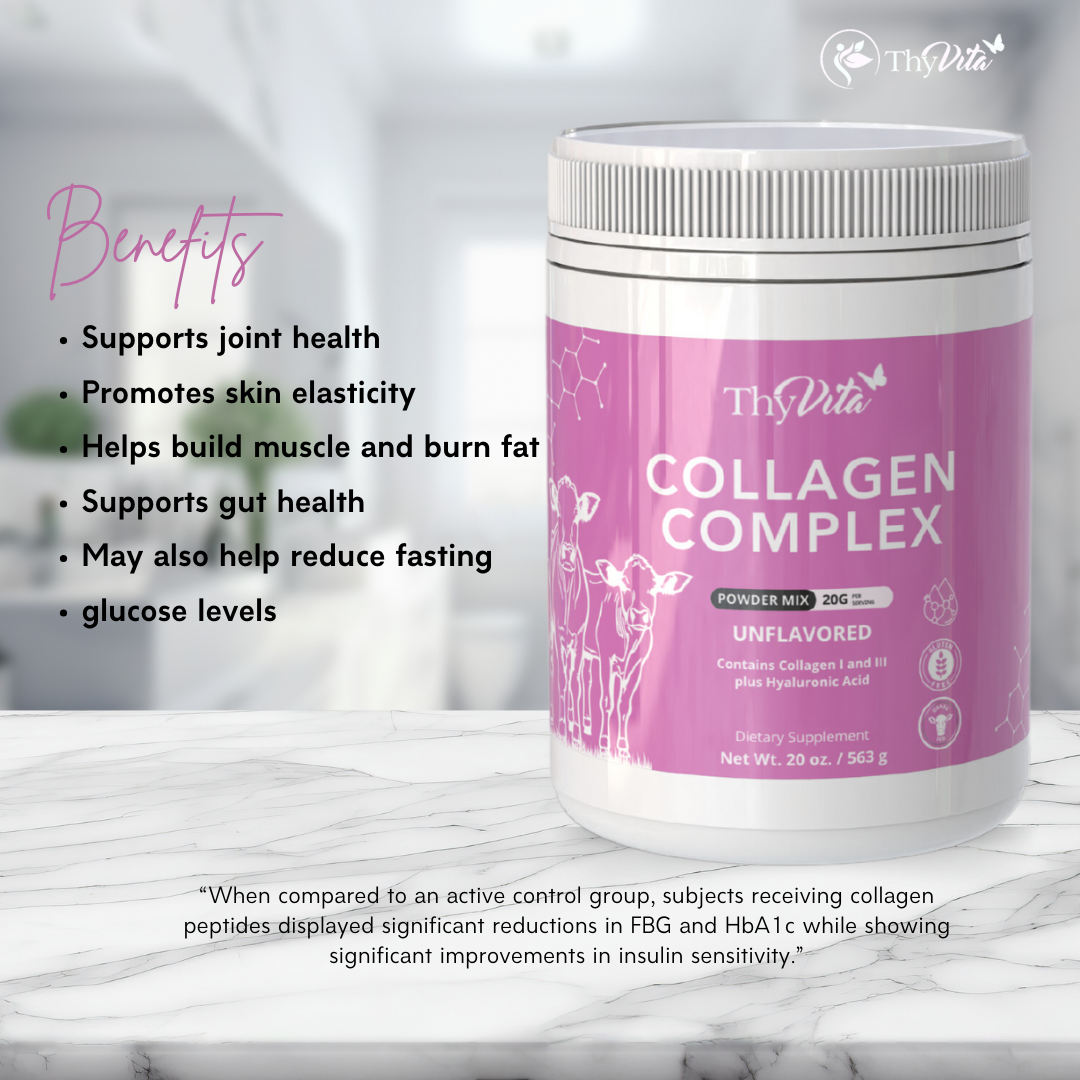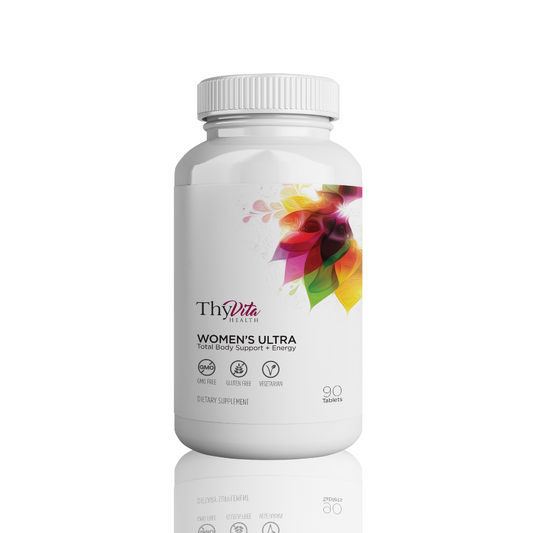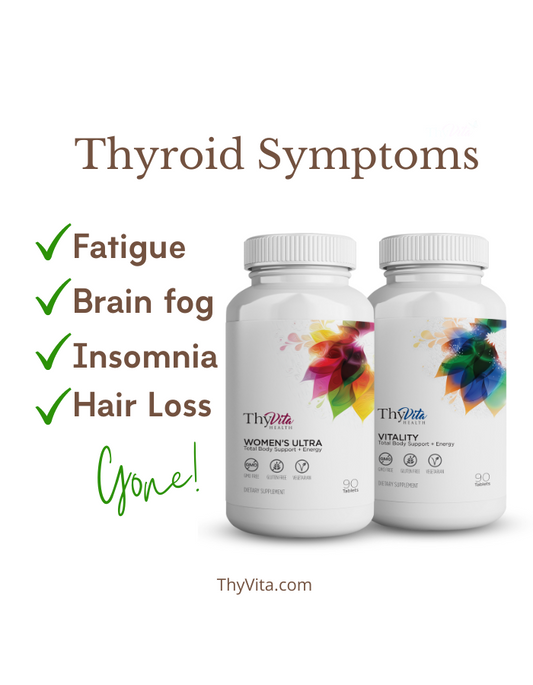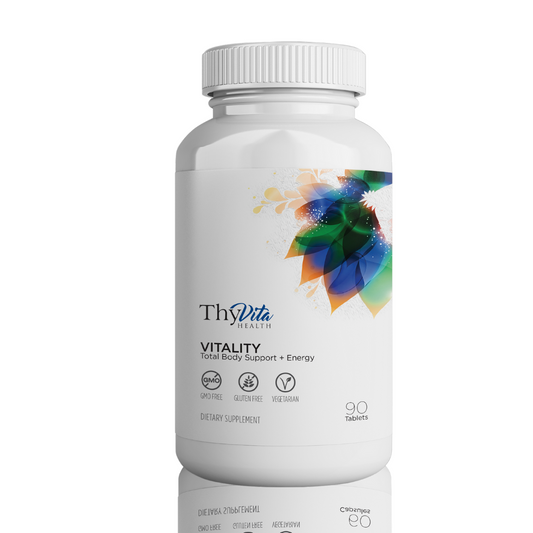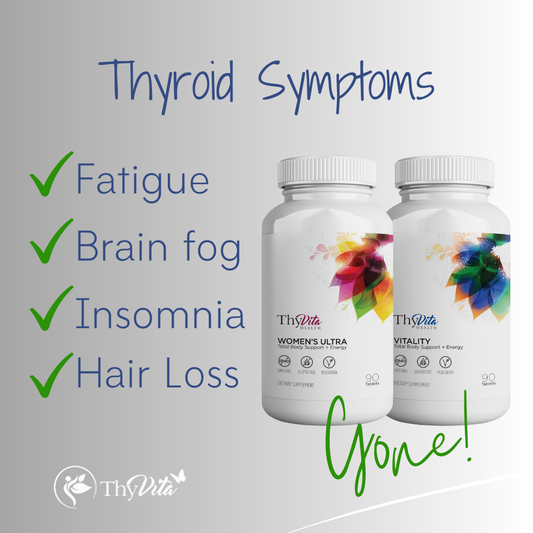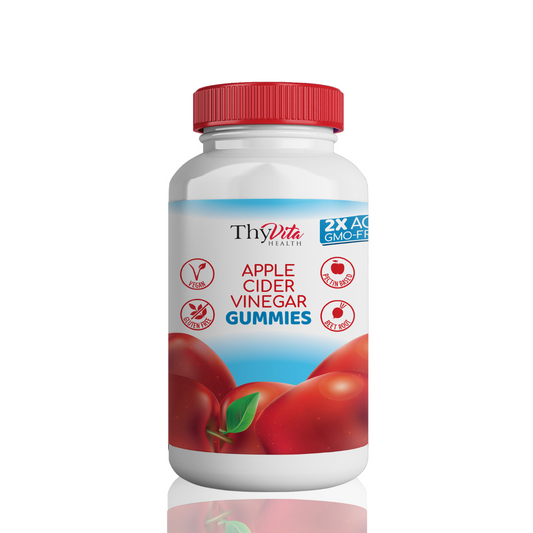The #1 Thyroid Vitamin
Thyroid Collagen Complex (Ships May 21st)
Thyroid Collagen Complex (Ships May 21st)
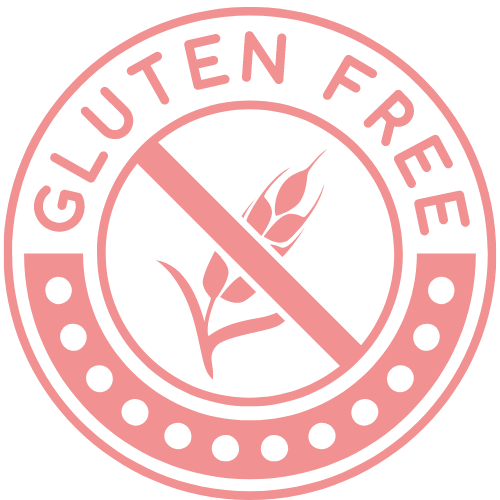 .
.
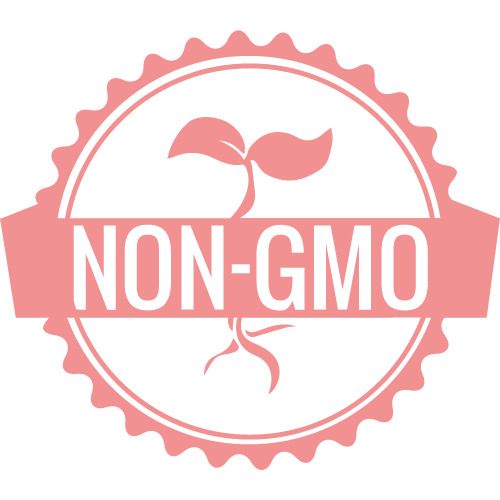 .
.
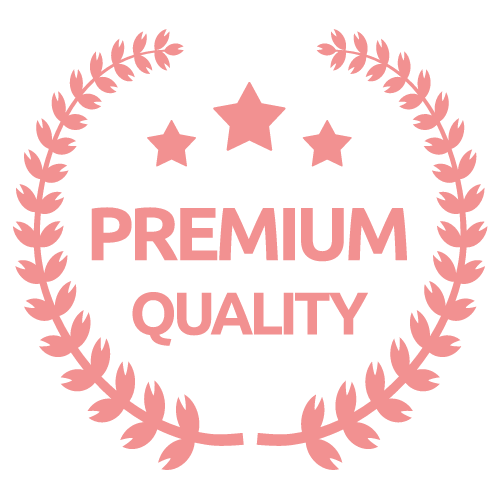 .
.
ThyVita Collagen Complex is meticulously formulated to cater to the unique requirements of thyroid patients. This specialized blend incorporates collagen peptides to directly bolster collagen levels, complemented by ingredients such as hyaluronic acid that stimulates the body's innate collagen production. Offering vital support for tissues susceptible to the effects of thyroid dysfunction—including hair, skin, nails, ligaments, tendons, and bones—ThyVita Collagen Complex serves as a comprehensive solution for enhanced well-being, tailored especially for thyroid patients.
Couldn't load pickup availability
 $5 US SHIPPING
$5 US SHIPPING
 MONEY-BACK GUARANTEE
MONEY-BACK GUARANTEE
 FREE DHL EXPRESS UPGRADE FOR INT'L
FREE DHL EXPRESS UPGRADE FOR INT'L
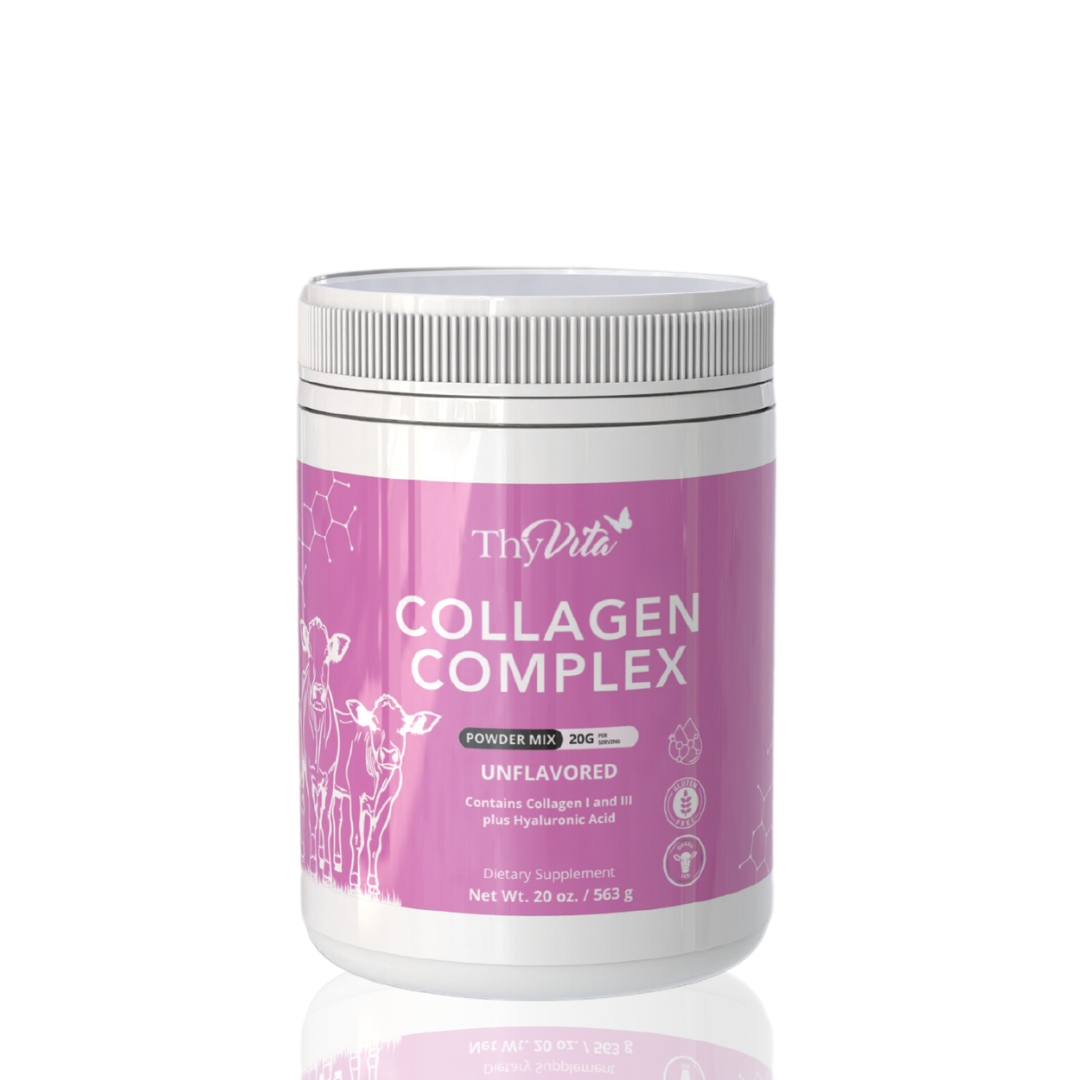
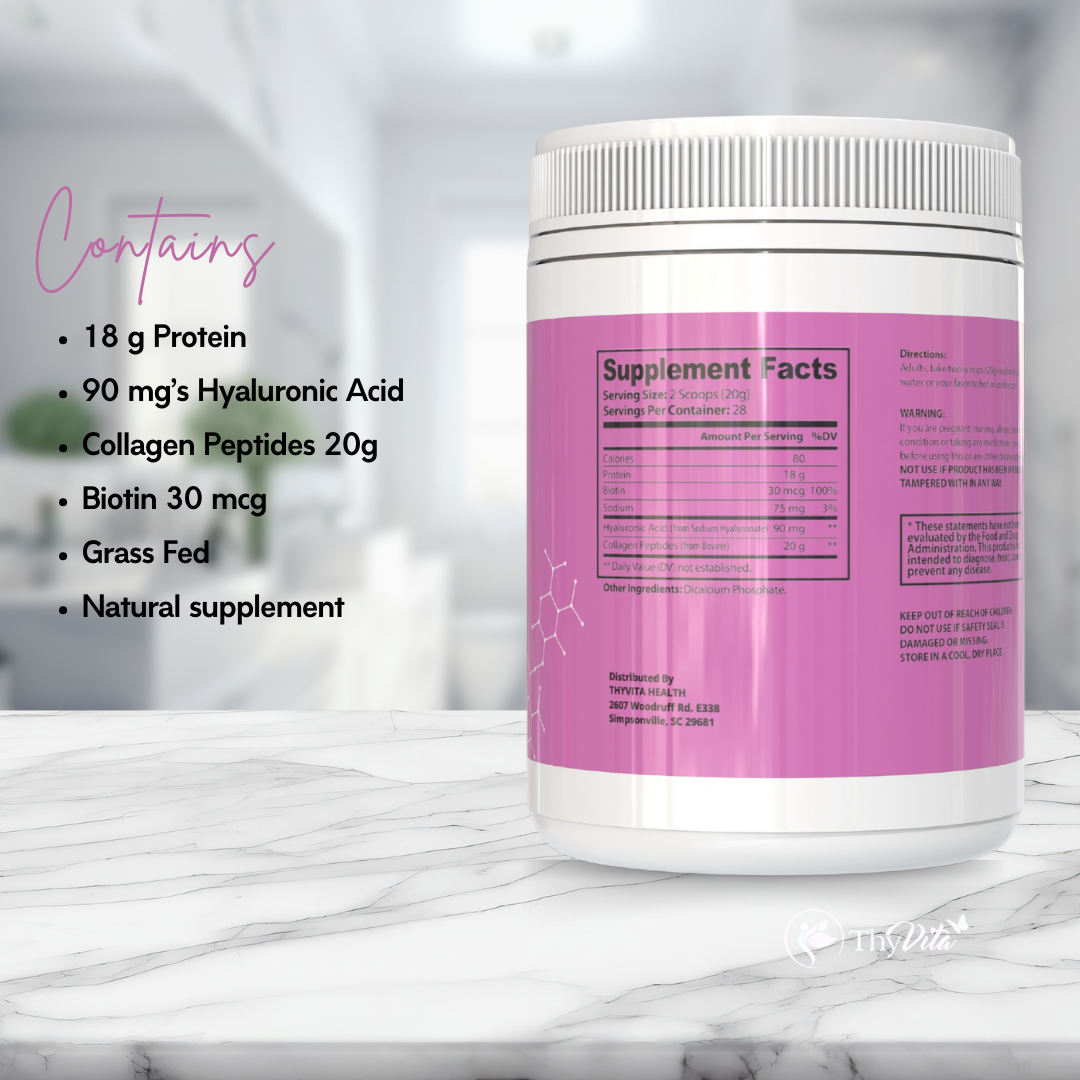
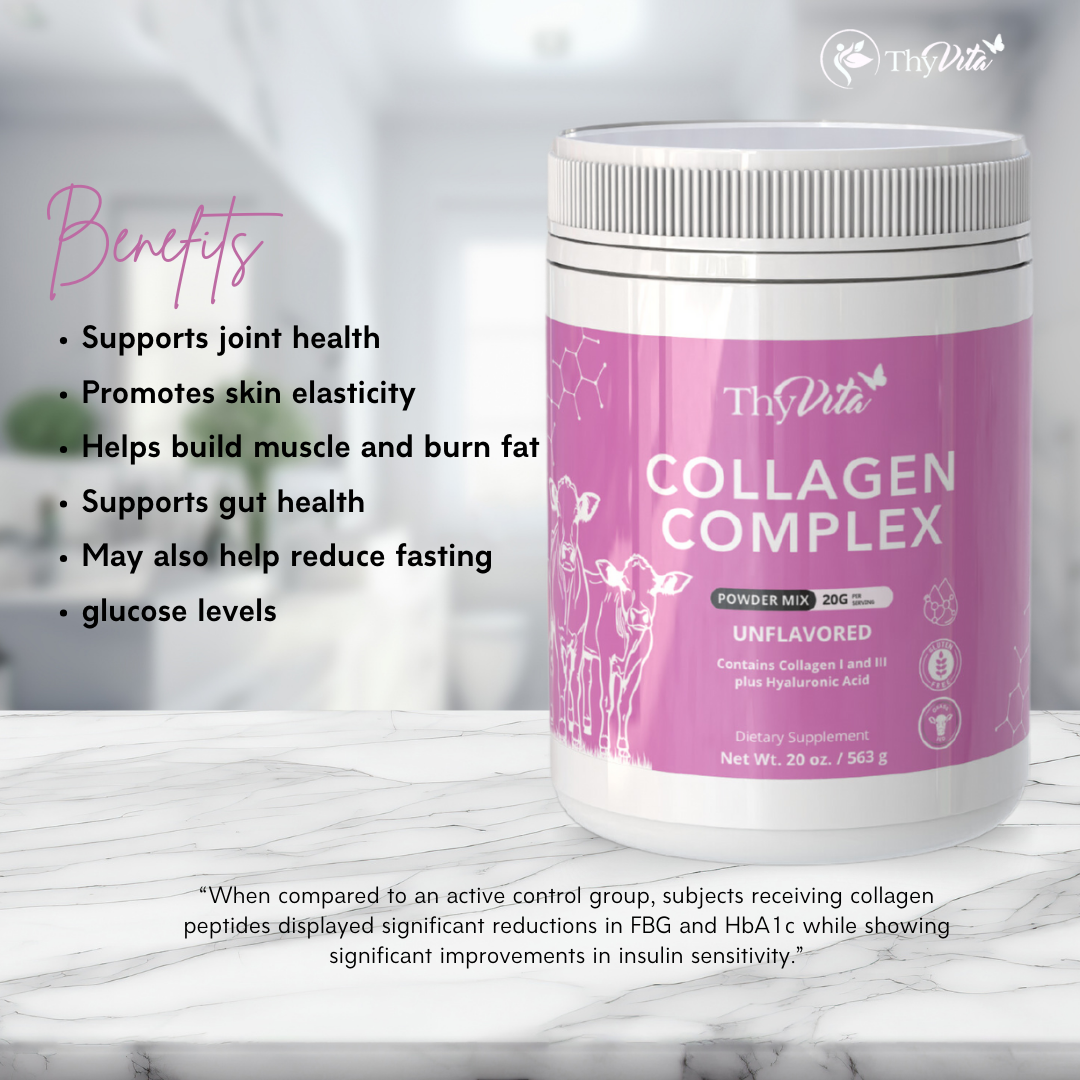

ThyVita supplements exclusively feature premium ingredients, rigorously subjected to third-party testing to ensure they are free from GMOs, are vegetarian and gluten-free, reflecting our commitment to providing high-quality and inclusive dietary supplements.
Does it seem like you aged ten years just one year after thyroidectomy?
If so there's a reason for it. Collagen is the most abundant protein in the human body and is a key component of connective tissues, such as tendons, ligaments, skin, and bones. It provides structural support, strength, and elasticity to various tissues and organs. Collagen molecules are made up of amino acids, primarily glycine, proline, and hydroxyproline, and they form a triple helix structure, giving collagen its characteristic strength.
There are several types of collagen, each with specific roles in the body. For example:
- Type I collagen is the most abundant type and is found in skin, bones, tendons, and ligaments.
- Type II collagen is primarily found in cartilage, providing cushioning and support to joints.
- Type III collagen is often found alongside type I collagen and contributes to the structure of organs, blood vessels, and skin.
Collagen production naturally declines with age, leading to changes in skin elasticity, joint health, and overall tissue function. Therefore, collagen supplements have gained popularity as a means to support skin health, joint function, and overall well-being. These supplements typically contain hydrolyzed collagen peptides, which are broken down into smaller fragments that are easier for the body to absorb and utilize.
What occurs to collagen after thyroidectomy or in thyroid disease diagnosis?
Collagen breakdown in thyroidectomy patients can occur due to several factors related to the surgical procedure, changes in hormone levels and nutrition absorption. It's needed to support tissue structure, wound healing, and overall skin health.
1. Surgical Trauma: Thyroidectomy involves the surgical removal of part or all of the thyroid gland. During the procedure, surrounding tissues, including muscles, nerves, and blood vessels, may be manipulated or damaged, leading to tissue trauma. This trauma can trigger inflammatory responses and the release of enzymes that contribute to collagen breakdown.
2. Hormonal Changes: The thyroid gland produces hormones such as thyroxine (T4) and triiodothyronine (T3), which play crucial roles in regulating metabolism and maintaining tissue health. Following thyroidectomy, patients may experience changes in hormone levels, particularly if the entire thyroid gland is removed and they require hormone replacement therapy. Hormonal imbalances, particularly hypothyroidism (underactive thyroid), can affect tissue metabolism and turnover, potentially leading to collagen breakdown.
3. Inflammation: Surgical procedures, including thyroidectomy, can induce inflammatory responses in the body. Inflammation is associated with the activation of various enzymes, such as matrix metalloproteinases (MMPs), which play roles in tissue remodeling and collagen degradation. Excessive or prolonged inflammation can contribute to increased collagen breakdown in the surgical site and surrounding tissues.
4. Nutritional Deficiencies: This seems to be a common denominator is thyroid disease and thyroidectomy and can be the root cause for most negative side effects that occur after surgery or with thyroid disease in general. Adequate nutrition is essential for collagen synthesis and maintenance of connective tissues. Thyroidectomy patients may experience changes in appetite, dietary intake, or nutrient absorption due to low stomach acid, which can lead to nutritional deficiencies. Deficiencies in vitamins and minerals required for collagen synthesis, such as vitamin C and zinc, can impair collagen production and contribute to collagen breakdown. In fact, research shows most thyroid patients suffer from low stomach acid which impacts digestion and converting food to absorbable nutrients. Talking with your doctor about nutritional supplementation to help correct deficiencies can help reduce the multitude of side effects even when your TSH is normal. ThyVita was created specifically for this purpose. It’s the first multi and thyroid supplement of it’s kind and it’s Patented!
Overall, collagen breakdown in thyroidectomy patients may result from a combination of nutritional deficiencies, surgical trauma, hormonal changes, impaired wound healing, and inflammation. Management strategies aimed at optimizing wound healing, hormone replacement therapy, and nutritional support may help mitigate collagen breakdown and promote tissue recovery in thyroid patients.
Understanding the Benefits of Collagen Supplementation for Your Health.
In the context of thyroidectomy patients, collagen can aid in several ways:
1. Wound Healing: After thyroidectomy, patients have surgical incisions that need to heal properly. Collagen provides structural support to the wound site, helping it to close efficiently and reducing the risk of complications such as infection.
2. Prevention of Scarring: Collagen helps minimize scar formation by promoting the alignment of collagen fibers during the healing process. This can lead to less noticeable scars for thyroidectomy patients.
3. Tissue Repair: Thyroidectomy can result in tissue trauma and damage, which requires repair. Collagen is essential for rebuilding and repairing damaged tissues, contributing to the overall recovery process.
4. Skin Elasticity: Collagen is a major component of the skin and contributes to its elasticity and firmness. Maintaining adequate collagen levels can help prevent sagging skin and maintain a youthful appearance, even after thyroidectomy.
5. Nutrient Transport: Collagen provides a scaffold for the transport of nutrients and oxygen to cells involved in wound healing and tissue repair. This ensures that the surgical site receives the necessary nutrients for optimal recovery.
6. Support for Hormone Replacement Therapy: For patients who require hormone replacement therapy after thyroidectomy, collagen can support the effectiveness of these treatments by promoting overall tissue health and metabolism.
In summary, collagen plays a vital role in supporting the overall healing process and promoting tissue health in thyroidectomy patients. By maintaining adequate collagen levels, patients may experience improved side effects, more skin elasticity, better joints and wound healing, reduced scarring, and better overall outcomes post-surgery. Talk with your doctor or pharmacist and see if ThyVita Women's Ultra and our Collagen Complex are a good fit for you!
Frequently Asked Questions
Find answers to your most frequently asked questions about this product below.
Collapsible content
Can I take this if I don't have a thyroid?
Yes, in fact ThyVita was created specifically for patients with and without a thyroid. As always check with your doctor before beginning a new vitamin regimen.
How big are the caplets?
ThyVita caplets are about the same size as Tylenol caplets. Since they have 22 ingredients we think the size is great, but it's really up to the individual.
Does this have iron or iodine?
ThyVita Women's Ultra does contain iron and iodine as well as folic acid. However if you cannot take these ingredients our sister formula (Vitality) does not contain iron or iodine and instead of folic acid it contains folate.
Does this have enough Vitamin D?
The Vitamin D council recommends 5,000 units of Vitamin D per day. ThyVita contains 4,000 units per day (per 3 tablets). If you require more than that you should consult your doctor for proper diagnosing and blood tests to see if you require an additional supplementation.
Does this contain fish?
ThyVita does not contain fish, but our iodine is harvested from kelp.
Will this replace other vitamins or thyroid meds?
ThyVita is a support in thyroid treatment, it is not a replacement for thyroid medication. However, in most cases ThyVita usually replaces most other supplements unless your doctor has you on higher doses than are included in our supplement. Check with your doctor or pharmacist to see how to properly fit ThyVita into your regimen.
Does this have enough Selenium?
ThyVita's ingredients coactively work together for optimal results, our formula uniquely utilizes 20 mcg's of selenium and because our patented ingredients have higher abosrption so you'll see and feel the difference not only physically, but in your hair and health as well. As always consult with your physician if feel you might need more than what is contained in ThyVita.
Can ThyVita be taken with thyroid medication?
ThyVita can be taken in connection with thyroid medication but must be separated by 4 hours or more. Most people take it at lunchtime or late morning for best results.
Customers who bought this item also bought
-
ThyVita Women's Ultra
5.0 / 5.0
(3) 3 total reviews
Regular price $35.99Regular priceUnit price / per$39.99Sale price $35.99Sale -
ThyVita Vitality
1.0 / 5.0
(1) 1 total reviews
Regular price $42.99Regular priceUnit price / per$42.99Sale price $42.99 -
Life After Thyroidectomy
Regular price $18.95Regular priceUnit price / per$22.95Sale price $18.95Sale -
Apple Cider Vinegar Gummies w/ 2X ACV
5.0 / 5.0
(1) 1 total reviews
Regular price $24.99Regular priceUnit price / per$24.99Sale price $24.99
